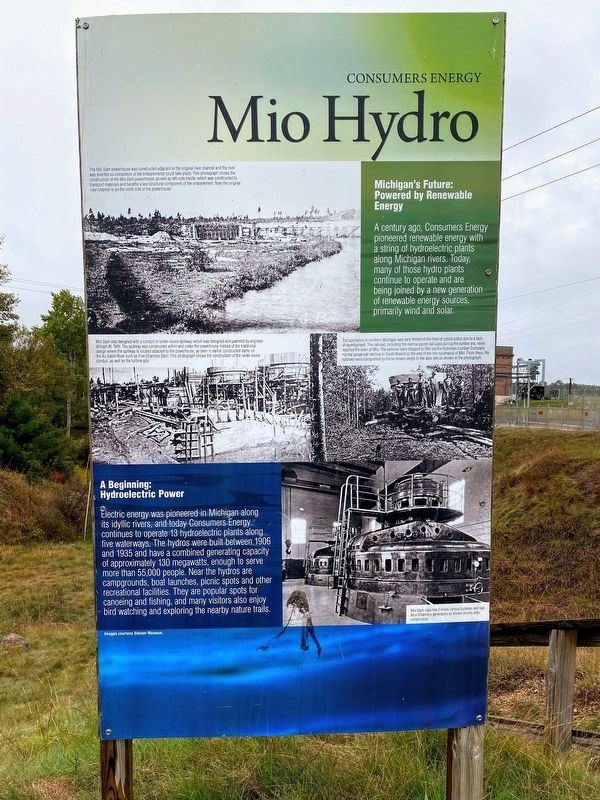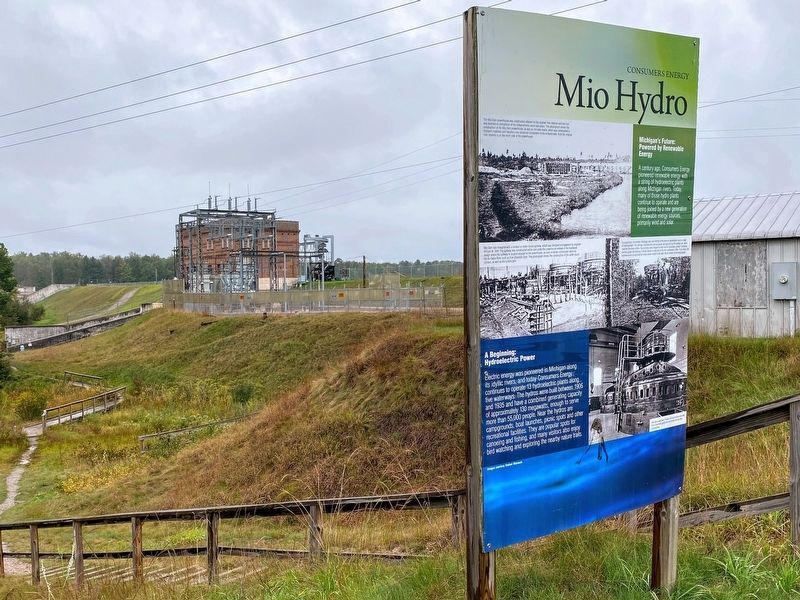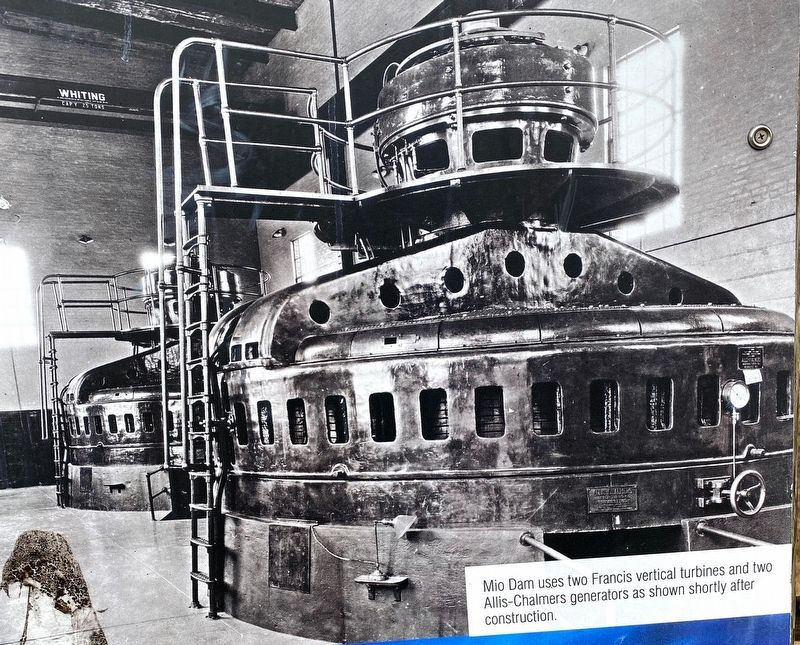Mio in Oscoda County, Michigan — The American Midwest (Great Lakes)
Mio Hydro
Consumers Energy
A century ago, Consumers Energy pioneered with a string of hydroelectric plants along Michigan rivers. Today, many of those hydro plants continue to operate and are being joined by a new generation of renewable energy sources, primarily wind and solar.
A Beginning: Hydroelectric Power
Electric energy was pioneered in Michigan along its idyllic rivers, and today Consumers Energy continues to operate 13 hydroelectric plants along five waterways. The hydros were built between 1906 and 1935 and have a combined generating capacity of approximately 130 megawatts, enough to serve more than 55,000 people. Near the hydros are campgrounds, boat launces, picnic spots and other recreational facilities. They are popular spots for canoeing and fishing, and many visitors also enjoy bird watching and exploring the nearby nature trails.
Topics. This historical marker is listed in these topic lists: Industry & Commerce • Waterways & Vessels. A significant historical year for this entry is 1906.
Location. 44° 39.709′ N, 84° 7.834′ W. Marker is in Mio, Michigan, in Oscoda County. Marker is on Pond Drive near Lockwood Lane, on the left when traveling west. Located on the access road to the Mio Dam. Touch for map. Marker is in this post office area: Mio MI 48647, United States of America. Touch for directions.
Other nearby markers. At least 3 other markers are within walking distance of this marker. Mio Hydroelectric Plant / Hydroelectric Power (within shouting distance of this marker); Oscoda County Veterans Memorial (approx. 0.8 miles away); In Memory of James L. Swiderski (approx. 0.9 miles away).
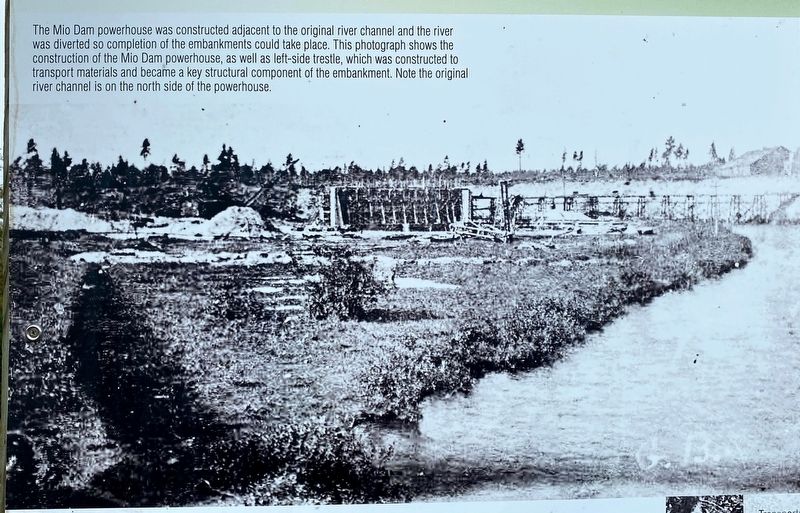
Photographed By J.T. Lambrou, September 21, 2021
3. Mio Hydro Marker
Inset photo (top left) caption: The Mio Dam powerhouse was constructed adjacent to the original river channel and the river was diverted so completion of the embankments could take place. This photograph shows the construction of the Mio Dam powerhouse, as well as left-side trestle, which was constructed to transport materials and became a key structural component of the embankment. Note the original river channel is on the north side of the powerhouse.

Photographed By J.T. Lambrou, September 21, 2021
4. Mio Hydro Marker
Inset photo (middle left) caption: Mio Dam was designed with a conduit or under-sluice spillway, which was designed and patented by engineer William W. Tefft. The spillway was constructed within and under the powerhouse instead of the traditional design where the spillway is located adjacent to the powerhouse, as seen in earlier constructed dams on the Au Sable River such as Five Channels Dam. This photograph shows the construction of the under sluice conduit, as well as the turbine pits.
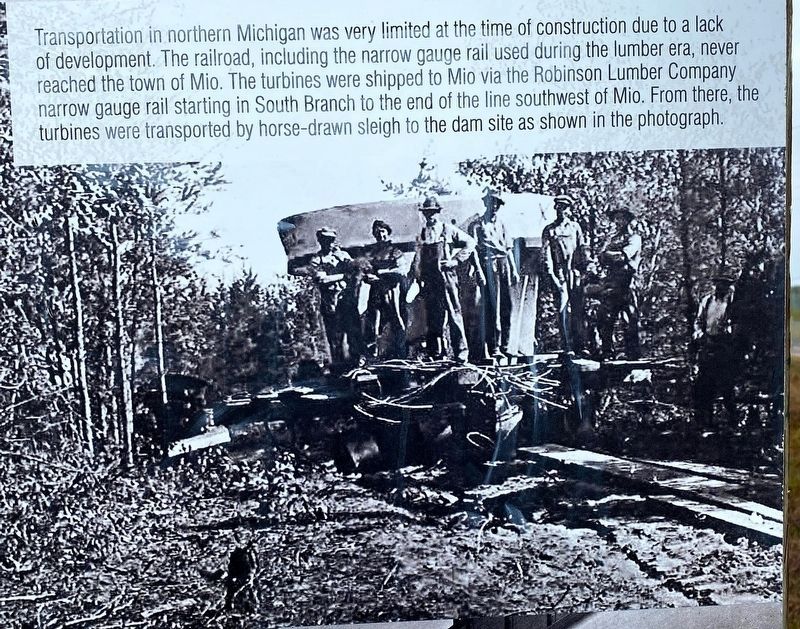
Photographed By J.T. Lambrou, September 21, 2021
6. Mio Hydro Marker
Inset photo (middle right) caption: Transportation in northern Michigan was very limited at the time of construction due to a lack of development. The railroad, including the narrow gauge rail used during the lumber era, never reached the town of Mio. The turbines were shipped to Mio via the Robinson Lumber Company narrow gauge rail starting in South Branch to the end of the line southwest of Mio. From there, the turbines were transported by horse-drawn sleigh to the dam site as shown in the photograph.
Credits. This page was last revised on September 25, 2021. It was originally submitted on September 23, 2021, by J.T. Lambrou of New Boston, Michigan. This page has been viewed 103 times since then and 11 times this year. Photos: 1, 2, 3, 4, 5, 6. submitted on September 23, 2021, by J.T. Lambrou of New Boston, Michigan. • Mark Hilton was the editor who published this page.
